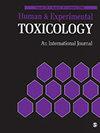姜黄素通过抑制细胞间粘附分子1/CD40/NF-κB信号通路减轻脂多糖诱导的H9c2细胞损伤
IF 2.7
4区 医学
Q3 TOXICOLOGY
引用次数: 2
摘要
据报道,姜黄素有很多好处,包括抗炎、抗癌等。本研究旨在探讨姜黄素对脂多糖(LPS)损伤H9c2细胞的作用。方法LPS刺激H9c2细胞模拟体外心肌炎损伤模型。应用比较毒物基因组学数据库(CTD)检测与姜黄素相关的基因。应用GEO数据库分析心肌炎患者细胞间粘附分子1 (ICAM1)和CD40的表达。利用KEGG富集分析研究与差异表达基因相关的有意义通路。分别采用细胞计数试剂盒-8、流式细胞术、免疫印迹法、ELISA法观察各组细胞增殖、凋亡、ICAM1/CD40/P65- NF-κ b表达及TNF-α、IL-6、IL-10水平。结果姜黄素处理后,LPS诱导的H9c2细胞活性下降得到改善。在心肌炎患者中高表达的ICAM1和CD40被确定为姜黄素的靶点,并受到姜黄素的负调控。抑制ICAM1或CD40可增强姜黄素对lps诱导的H9c2细胞损伤的保护作用,同时增加细胞活力,减少细胞凋亡和炎症。此外,姜黄素的添加或ICAM1/CD40的缺失可抑制p-P65 NF-κB的表达。结论姜黄素通过抑制ICAM1/CD40/NF-κB减轻lps诱导的H9c2细胞损伤,为姜黄素临床应用提供了可能的分子机制。本文章由计算机程序翻译,如有差异,请以英文原文为准。
Curcumin alleviated lipopolysaccharide-evoked H9c2 cells damage via suppression of intercellular adhesion molecule 1/CD40/NF-κB signaling
Background Curcumin has been reported to have many benefits, including anti-inflammatory, anti-cancer, and so on. In this research, we aimed to investigate the function of curcumin on lipopolysaccharide (LPS)-injured H9c2 cells. Methods H9c2 cells stimulated by LPS mimic the in vitro model of myocarditis injury. Comparative Toxicogenomics Database (CTD) was applied to detect the genes associated with curcumin. GEO database was used to analyze Intercellular Adhesion Molecule 1 (ICAM1) and CD40 expression in myocarditis patients. KEGG enrichment analysis was employed to investigate the meaningful pathways related to differentially expressed genes. Cell proliferation, apoptosis, expression of ICAM1/CD40/P65- NF-κB, and level of TNF-α, IL-6, and IL-10 were observed by cell counting kit-8, flow cytometry and western blotting assays, ELISA assay, respectively. Results After curcumin treatment, the decreased activity of H9c2 cells evoked by LPS was improved. ICAM1 and CD40, which highly expressed in myocarditis patients, were identified as targets of curcumin and negatively regulated by curcumin. Inhibition of ICAM1 or CD40 strengthened the protective effect of curcumin on LPS-evoked H9c2 cells damage, accompanied by increased cell viability and decreased cell apoptosis and inflammation. Additionally, addition of curcumin or depletion of ICAM1/CD40 suppressed p-P65 NF-κB expression. Conclusions Curcumin mitigated LPS-evoked H9c2 cells damage by suppression of ICAM1/CD40/NF-κB, providing a potential molecular mechanism for the clinical application of curcumin.
求助全文
通过发布文献求助,成功后即可免费获取论文全文。
去求助
来源期刊
CiteScore
5.70
自引率
3.60%
发文量
128
审稿时长
2.3 months
期刊介绍:
Human and Experimental Toxicology (HET), an international peer reviewed journal, is dedicated to publishing preclinical and clinical original research papers and in-depth reviews that comprehensively cover studies of functional, biochemical and structural disorders in toxicology. The principal aim of the HET is to publish timely high impact hypothesis driven scholarly work with an international scope. The journal publishes on: Structural, functional, biochemical, and molecular effects of toxic agents; Studies that address mechanisms/modes of toxicity; Safety evaluation of novel chemical, biotechnologically-derived products, and nanomaterials for human health assessment including statistical and mechanism-based approaches; Novel methods or approaches to research on animal and human tissues (medical and veterinary patients) investigating functional, biochemical and structural disorder; in vitro techniques, particularly those supporting alternative methods

 求助内容:
求助内容: 应助结果提醒方式:
应助结果提醒方式:


